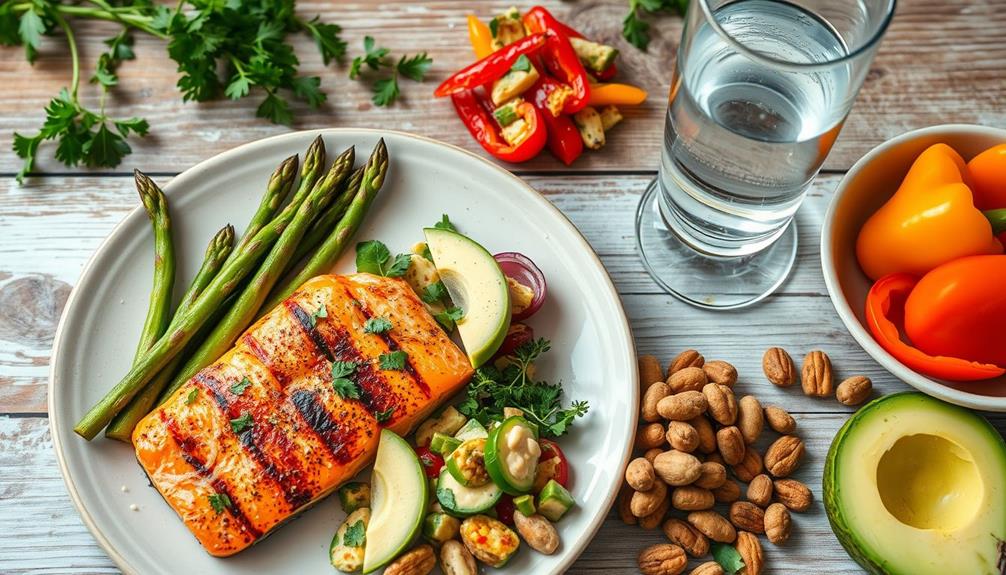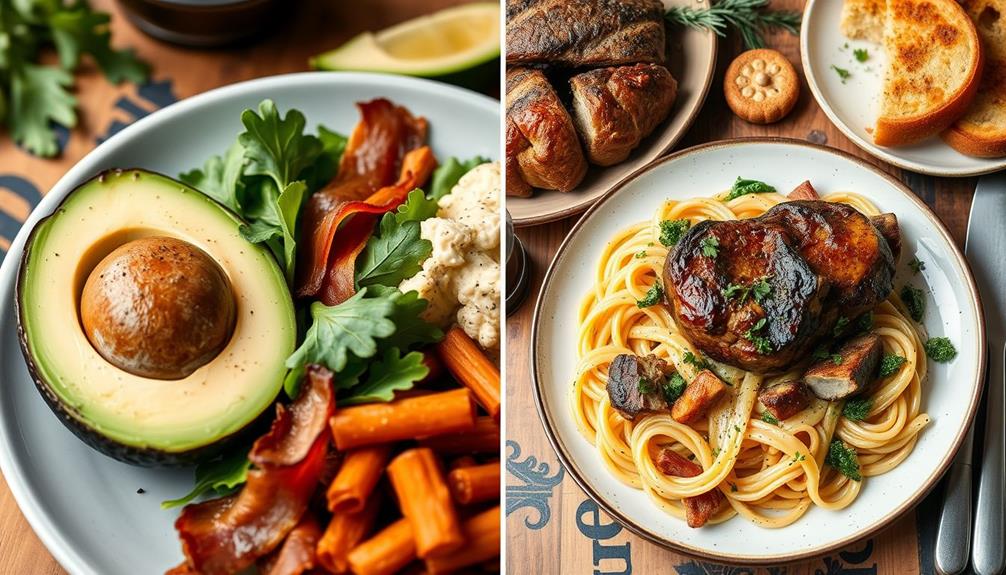To lose weight on the keto diet, focus on limiting your carbohydrates to 20-50 grams per day, which shifts your body into ketosis. This process encourages it to burn stored fat for energy instead of glucose. Aim for a macronutrient ratio of about 70-75% fats, 20-25% protein, and only 5-10% carbohydrates. Meal planning is essential, as it helps manage your carb intake and prevents impulsive eating. Additionally, staying active and monitoring your progress through measurements or ketone levels will keep you motivated. There's plenty more to learn about optimizing your keto journey for the best results ahead.
Key Takeaways
- Restrict carbohydrate intake to 20-50 grams daily to promote ketosis and fat burning.
- Focus on high-fat, low-carb foods, maintaining a macronutrient ratio of 70-75% fat, 20-25% protein, and 5-10% carbohydrates.
- Plan meals in advance to avoid high-carb temptations and maintain consistency in your diet.
- Monitor progress using ketone testing and body measurements to assess weight loss and ketosis levels.
- Engage in regular physical activity and manage stress to enhance metabolism and support weight loss efforts.
Understanding the Keto Diet
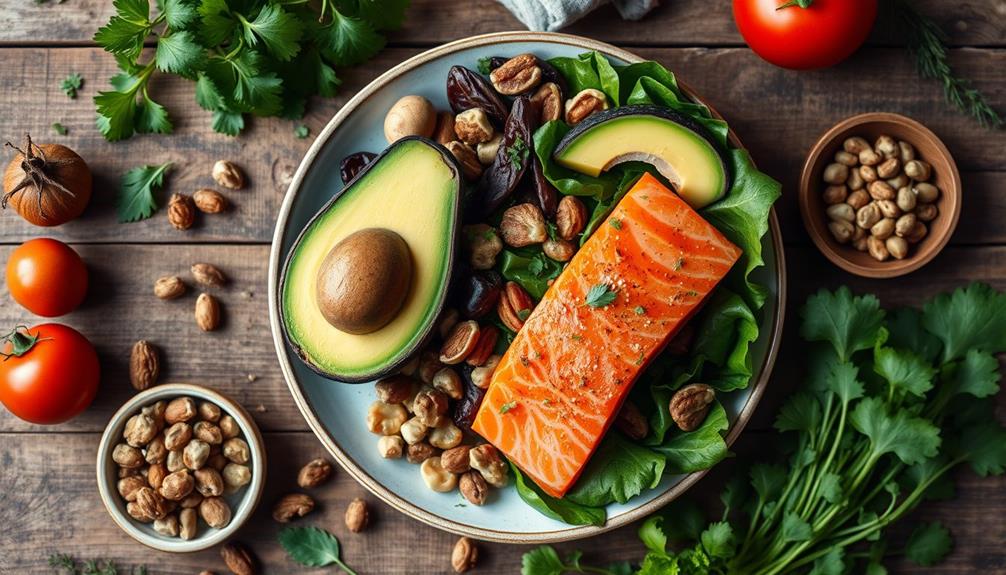
The ketogenic diet, often referred to as the keto diet, is a high-fat, low-carbohydrate eating plan designed to shift your body's metabolism into a state called ketosis. To achieve this, you'll need to limit your carbohydrate intake to about 20-50 grams per day. When you do this, your body begins to burn fat for energy instead of glucose, which can lead to weight loss.
It's significant to highlight that the potential side effects of dietary changes can include gastrointestinal issues, so monitoring how your body responds to the keto diet is imperative.
The macronutrient composition of a typical ketogenic diet consists of approximately 70% fat, 25% protein, and only 5% carbohydrates. This ratio is essential for successfully entering and maintaining ketosis.
You'll want to focus on whole, nutrient-dense foods such as avocados, nuts, seeds, oils, and low-carb vegetables while avoiding grains, sugars, high-carb fruits, and starchy vegetables.
Monitoring your progress is crucial. You can confirm you're in ketosis through urine ketone testing or by recognizing symptoms like increased thirst, reduced hunger, and a distinctive breath odor.
Additionally, meal planning and preparation will help you stay on track, manage cravings, and guarantee you meet your macronutrient goals. Understanding these fundamentals will set you on the path to success with the keto diet.
Essential Macronutrient Ratios
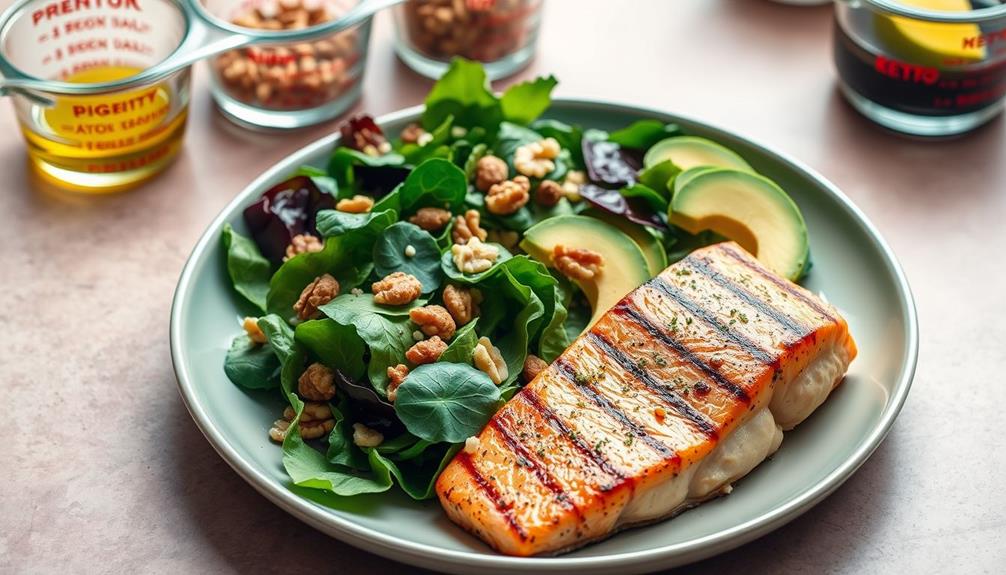
Achieving and maintaining ketosis requires careful attention to your macronutrient ratios. For the ketogenic diet, aim for about 70-75% of your daily calories from fat, 20-25% from protein, and only 5-10% from carbohydrates. This specific balance is essential for effectively inducing and sustaining ketosis, much like how diversification of retirement portfolio is necessary in a volatile economy.
Your carbohydrate intake should be limited to around 20-50 grams per day, depending on your individual caloric needs. This restriction helps your body switch from using glucose for energy to utilizing ketones, which are produced from fat.
Be cautious with protein; while it's important, excess protein can be converted to glucose through gluconeogenesis. As a result, keep your protein intake within the 20-25% range of total calories to avoid hindering your ketosis.
Monitoring these macronutrient ratios is significant. Even small deviations can disrupt your state of ketosis and slow your weight loss progress.
To simplify this process, consider using a keto calculator. It can help you determine your specific macronutrient needs based on your weight, activity level, and weight loss goals, ensuring you stay on track as you pursue your keto journey.
Benefits of Ketosis for Weight Loss

When you enter ketosis, your body shifts into a fat-burning mode, converting stored fats into energy.
This process not only helps you shed pounds but also keeps your appetite in check, making it easier to stick to your goals.
Incorporating a balanced diet rich in fruits and vegetables can further enhance your weight loss journey on keto.
Plus, you'll likely notice a boost in your energy levels as your body efficiently uses fat for fuel.
Enhanced Fat Burning
Releasing the power of ketosis can transform your weight loss journey by shifting your body's energy source from carbohydrates to fat. When you follow a ketogenic diet, your body enters a state of ketosis, where it begins to utilize fat as its primary fuel. This process enhances fat burning and greatly boosts weight loss.
Additionally, understanding the principles of common financial terms can help you manage the costs associated with maintaining a healthy diet.
During ketosis, your liver converts fatty acids into ketones, providing an efficient energy source for both your brain and muscles. As a result, you'll notice increased fat oxidation and a reduced reliance on glucose.
Studies have shown that individuals on a ketogenic diet may lose weight up to 2.2 times more effectively than those on traditional low-fat diets. This improved fat utilization can be attributed to enhanced insulin sensitivity, which facilitates better fat mobilization and storage.
Additionally, the ketogenic diet often leads to reduced levels of hunger hormones, meaning you may experience less appetite and consume fewer calories without feeling deprived.
Controlled Appetite Regulation
Through the power of ketosis, you can effectively regulate your appetite, making your weight loss journey smoother and more manageable. When you're on a ketogenic diet, your body alters the levels of hunger hormones like ghrelin and leptin, leading to reduced feelings of hunger and increased satiety. This means you're less likely to overeat, helping you maintain a calorie deficit necessary for weight loss.
The ketogenic diet promotes fat oxidation, which not only supports fat burning but also helps you stay full for longer periods. Studies show that many people on this diet report a lower overall calorie intake, thanks to the satiating nature of high-fat and moderate-protein foods. Additionally, ketosis suppresses cravings for carbohydrates, making it easier to stick to your dietary restrictions.
Here's a quick overview of how the ketogenic diet aids appetite regulation:
| Benefit | Description |
|---|---|
| Hormone Regulation | Alters levels of ghrelin and leptin |
| Reduced Cravings | Suppresses carbohydrate cravings |
| Stabilized Blood Sugar | Minimizes hunger spikes and crashes |
Increased Energy Levels
Experiencing increased energy levels is one of the standout benefits of the ketogenic diet. When you enter ketosis, your body starts converting stored fat into ketones, which serve as an efficient fuel source compared to glucose. This change helps reduce fatigue, especially during your weight loss journey.
Many individuals on the ketogenic diet report a more stable energy supply throughout the day, minimizing those dreaded energy crashes that often accompany high-carb diets. Additionally, maintaining proper hydration, similar to the recommendations for managing ear pressure during colds, can further enhance your energy levels and overall well-being.
Research shows that the ketogenic diet enhances fat oxidation, making your body more effective at burning fat for energy. While you may face "keto flu" symptoms during the initial shift, once you're adapted, you'll likely notice improved mental clarity and focus. This boost can make it easier to stick to your weight loss goals.
Additionally, the increased energy levels you experience can elevate your physical performance and motivation, encouraging you to engage in regular exercise. This is vital for effective weight loss, as combining a ketogenic diet with an active lifestyle can lead to impressive results.
Embracing the ketogenic diet not only helps you shed pounds but also fuels your body for success.
Importance of Meal Planning
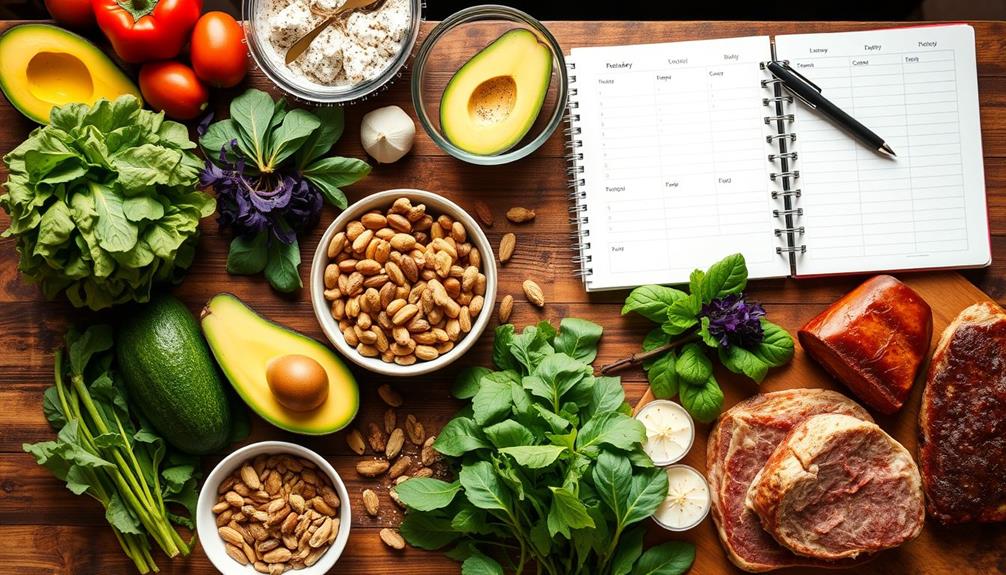
When starting on the keto diet, effective meal planning is vital to your success. It helps you maintain the strict carbohydrate limit of 20-50 grams per day, ensuring your body stays in ketosis for ideal fat burning. By preparing meals in advance, you can prevent impulsive eating of high-carb foods and stick to the recommended macronutrient ratios of approximately 70% fat, 25% protein, and 5% carbohydrates.
Additionally, incorporating a variety of beverages, such as black coffee or iced coffee, can aid weight loss when prepared with mindful ingredients, making them a great choice for your meal plan aiding weight loss. Using a keto calculator during meal planning allows you to track your calorie and macronutrient goals, making it easier to create balanced meals that support weight loss and energy levels. Incorporating a variety of keto-friendly foods like avocados, nuts, seeds, and low-carb vegetables enhances the nutritional quality of your meals and helps prevent diet fatigue.
Additionally, effective meal planning facilitates portion control, reducing the risk of overeating high-calorie keto foods. This is essential for maintaining a calorie deficit, which is necessary for achieving your weight loss goals. By prioritizing meal planning, you set yourself up for long-term success on your keto journey.
Overcoming Common Challenges

Overcoming common challenges on the keto diet can feel intimidating, but with the right strategies, you can navigate them successfully. One of the first hurdles you might encounter is the "keto flu," which can leave you feeling fatigued and irritable. To combat this, focus on staying hydrated, maintaining your electrolyte balance, and gradually cutting back on carbs.
Incorporating essential oils like eucalyptus oil can also support respiratory health, which may be beneficial if you're experiencing any discomfort during the changeover.
Meal planning is crucial for sticking to the keto diet. Create a weekly menu to help manage cravings and steer clear of impulsive high-carb choices. Incorporate non-starchy vegetables into your meals to boost fiber intake, which can alleviate digestive issues that may arise from a high-fat diet.
Mind your portion sizes, especially with calorie-dense foods like nuts and cheese. Keeping track of what you eat helps prevent excessive calorie consumption that can stall your weight loss progress.
Finally, make regular physical activity a priority. Engaging in both cardio and strength training can greatly enhance your weight loss efforts on the keto diet by revving up your metabolism and promoting fat burning.
With these strategies in place, you'll be well-equipped to tackle the challenges that come your way.
Healthy Food Choices
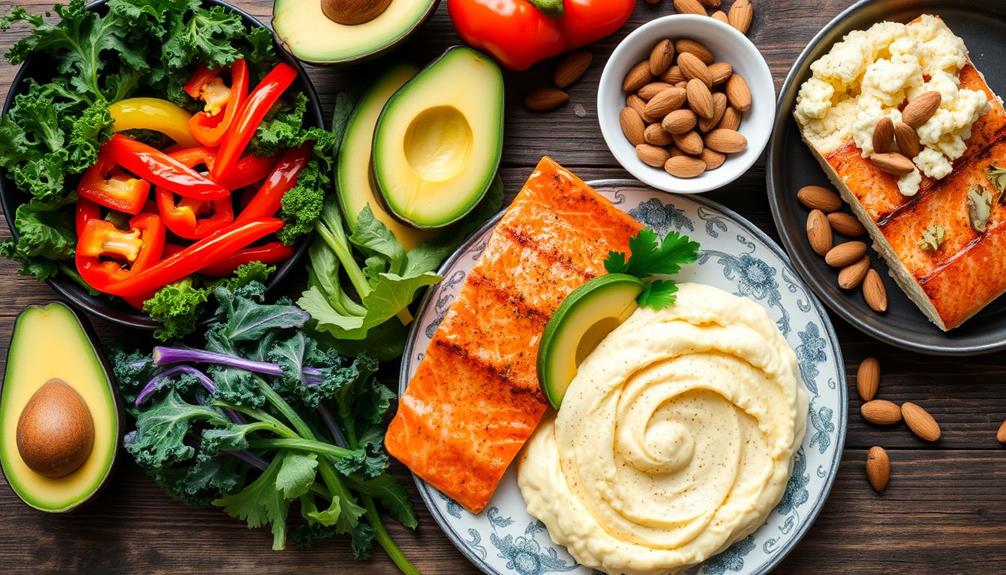
Making healthy food choices is essential for success on the keto diet. To thrive on this low carb diet, focus on incorporating high fat foods into your meals. Aim for about 70% of your daily caloric intake from healthy fats like avocados, nuts, seeds, and oils. Incorporating foods high in saturated fats, such as butter, can also be beneficial, as they provide flavor and can enhance your meals. These options not only keep you full but also provide essential nutrients.
When it comes to protein, choose moderate sources such as eggs, fish, and poultry. Guarantee that protein makes up only 25-30% of your total calorie intake to maintain ketosis effectively.
Don't forget to include non-starchy vegetables like leafy greens, broccoli, and zucchini. They'll help boost your nutrient and fiber intake while keeping your carb counts low.
Be cautious with processed "keto-friendly" snacks; they often contain hidden sugars or unhealthy ingredients that can derail your weight loss efforts.
Remember to regularly monitor your macronutrient ratios, aiming for 20-50 grams of carbohydrates per day. This careful attention to healthy food choices will help you achieve and maintain the ketosis necessary for weight loss success on the keto diet.
Monitoring Progress
To truly understand your progress on the keto diet, it's important to track weight changes regularly and measure your ketone levels.
Monitoring your overall health is vital, as financial considerations for elderly care can impact your ability to maintain a healthy lifestyle.
You should also assess body measurements, as they can reveal shifts that the scale mightn't show.
Tracking Weight Changes
Tracking your weight changes is essential for staying on course with the keto diet. Regularly monitoring your weight, ideally on a weekly basis, helps you observe your progress and identify any patterns or plateaus in your weight loss journey.
Additionally, incorporating elements of personal expression can enhance your motivation and commitment to the diet, much like how cultural beliefs often intertwine astrology with self-image and confidence.
It's important to remember that the scale isn't the only measure of success; muscle gain can offset fat loss.
To effectively track your progress, consider these tips:
- Record not just your weight but also body measurements (waist, hips, etc.).
- Use a food diary or app to log your daily calorie intake and macronutrient ratios.
- Set realistic weight loss goals, aiming for 1-3 pounds (0.5-1 kg) per week.
- Regularly check in on your ketosis status to guarantee you're within the recommended 5-10% carbohydrate limit.
Measuring Ketone Levels
Since monitoring your ketone levels is vital for ensuring you're in ketosis, using the right tools can make a significant difference in your weight loss journey on the keto diet. You have a few options for measuring ketone levels.
Urine test strips can give you a quick indication of ketone presence, while breath analyzers detect acetone, a type of ketone produced during ketosis. However, for the most accurate measurement, blood ketone meters are your best bet, with ideal ketosis typically indicated by blood ketone levels ranging from 1.5 to 3.0 mmol/L.
It's essential to test your ketone levels at various times of the day, especially in the morning and after meals. This helps you understand how different foods affect your ketosis.
Keep in mind that your ketone levels may not immediately reflect dietary changes; it usually takes 2-4 days of strict low-carb eating to enter ketosis and start producing measurable ketones.
Assessing Body Measurements
While monitoring ketone levels is important, reviewing your body measurements can provide even more insight into your weight loss journey on the keto diet.
Regularly measuring specific areas of your body helps you track changes in body composition that the scale mightn't reveal, especially if you're gaining muscle. Here are some key body measurements to reflect on:
- Waist circumference: A good indicator of fat loss around the abdomen.
- Hip circumference: Helps track changes in body shape.
- Thigh measurements: Useful for monitoring changes in lower body fat.
- Overall weight: Track this weekly for a clear picture of weight loss progress.
Using a tape measure allows you to see inches lost, giving you a thorough view of your success.
Keeping a journal to record these measurements and your weight can help you identify patterns and stay motivated.
Don't forget to take progress photos; they can visually showcase your results and keep you accountable.
Lifestyle Factors Impacting Weight Loss

Numerous lifestyle factors can greatly influence your weight loss journey on the keto diet. One significant factor is chronic stress, which can elevate cortisol levels and promote fat storage, particularly in your abdominal area. This can hinder your weight loss efforts.
Additionally, sleep deprivation disrupts hunger-regulating hormones, leading to increased appetite and potential overeating. You need quality sleep to maintain your calorie deficit effectively.
Incorporating regular physical activity is essential for your success on the keto diet. Exercise not only stimulates fat loss but also boosts your metabolism and improves your overall health.
Consider adding strength training to your routine; it enhances muscle mass, which increases your resting metabolic rate and aids in sustainable weight management.
Mindful eating practices can also play a vital role in your weight loss journey. Being aware of portion sizes and avoiding distractions during meals helps you make better food choices and stay in tune with your body's hunger signals.
Addressing Myths and Misconceptions

Clarifying misconceptions about the keto diet is essential for anyone looking to achieve successful weight loss. Many people hold onto myths that can derail their progress. Here are some common misconceptions you should be aware of:
- Unlimited High-Fat Foods: You can't eat as much high-fat food as you want; portion control and a calorie deficit are key.
- All Carbs Are Bad: Not all carbs are harmful; non-starchy vegetables are low in carbs and packed with essential nutrients and fiber.
- Weight Loss Equals Fat Loss: Initial weight loss often includes water weight from glycogen depletion, not just fat loss.
- One-Size-Fits-All: The keto diet isn't universal; individual responses vary, and not everyone will see the same weight loss results.
Understanding these misconceptions can help you navigate the keto diet more effectively.
It's important to approach this diet with realistic expectations and a balanced perspective, ensuring you're making choices that truly support your weight loss goals.
With accurate information, you can utilize the keto diet to your advantage rather than let misconceptions hold you back.
Resources for Success
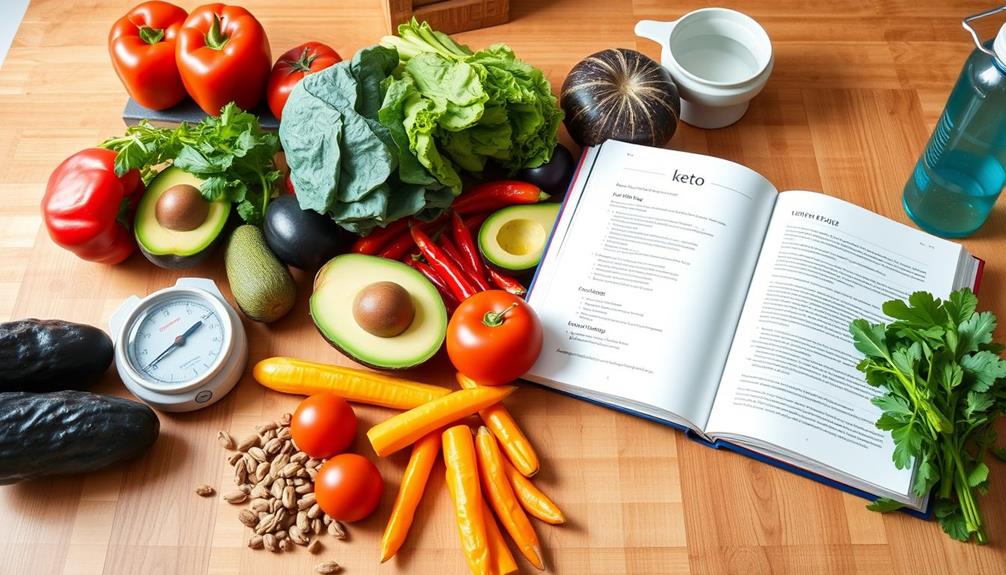
To succeed on the keto diet, effective meal planning strategies are essential.
You'll also benefit from engaging with a supportive community that shares your goals and challenges.
Together, these resources can keep you motivated and on track as you work towards your weight loss goals.
Meal Planning Strategies
Effective meal planning is key to succeeding on the keto diet, as it helps you stay organized and committed to your goals. By creating a weekly meal plan that focuses on high-fat low-carb foods, you can guarantee you stay within the recommended 20-50 grams of carbohydrates per day while maximizing nutrient intake.
Here are some essential meal planning strategies to take into account:
- Use an online keto calculator to determine your specific macronutrient needs, balancing your intake of fats, proteins, and carbohydrates effectively.
- Incorporate a variety of whole, unprocessed foods like avocados, nuts, seeds, full-fat dairy, and non-starchy vegetables to enhance meal variety and prevent dietary fatigue.
- Prepare meals in advance by batch cooking and portioning out snacks to avoid impulsive eating and keep high-calorie keto snacks in check.
- Keep a food diary or use a tracking app to log your meals and monitor your calorie and macronutrient intake, guaranteeing you maintain a calorie deficit essential for weight loss.
Supportive Community Engagement
Finding a supportive community can greatly enhance your success on the keto diet. Engaging with online forums and social media groups dedicated to keto allows you to connect with others who share your weight loss goals.
These platforms provide motivation, recipe sharing, and essential accountability, making your journey less lonely.
Utilizing apps that offer meal planning tools specifically for keto can streamline your grocery shopping and help you stick to your macronutrient targets.
Joining local keto meetups or workshops fosters real-life community support, giving you opportunities for face-to-face interactions and shared experiences.
Participating in challenges, like a 30-day keto commitment, can greatly boost your motivation through collective accountability. You're more likely to stay on track when you share your goals and progress with others.
Additionally, don't hesitate to seek guidance from registered dietitians or nutritionists specializing in the ketogenic diet. They can offer personalized advice tailored to your unique health needs and weight loss objectives.
Frequently Asked Questions
How to Speed up Weight Loss on Keto?
To speed up weight loss, aim for 20-50 grams of carbs daily, incorporate regular exercise, focus on whole foods, consider intermittent fasting, and track your calories to guarantee you're in a deficit.
How Much Weight Can You Lose in a Month on Keto?
You might think losing weight's a walk in the park, but on keto, you could shed 4 to 10 pounds in the first month. Just remember, results can vary based on your personal journey!
How to Do a Keto Diet to Lose Weight?
To successfully follow a keto diet for weight loss, you'll need to limit carbs, prioritize healthy fats, monitor your protein intake, incorporate non-starchy veggies, and maintain a calorie deficit while staying active.
What Is the Secret to Losing Weight on Keto?
The magic of shedding pounds lies in your choices. Embrace healthy fats, limit carbs, and stay active. It's all about balance and awareness. You'll discover how mindful eating can transform your journey effortlessly.
Conclusion
As you navigate the winding path of the keto diet, think of yourself as a skilled gardener tending to a flourishing plant. With the right nutrients and careful planning, you'll cultivate a healthier you. Embrace the challenges like weeds, pulling them out before they take root. Celebrate your progress as blossoms of success. Remember, every step you take brings you closer to the harvest of your goals. Keep nurturing this journey, and watch your efforts bloom into lasting change.
